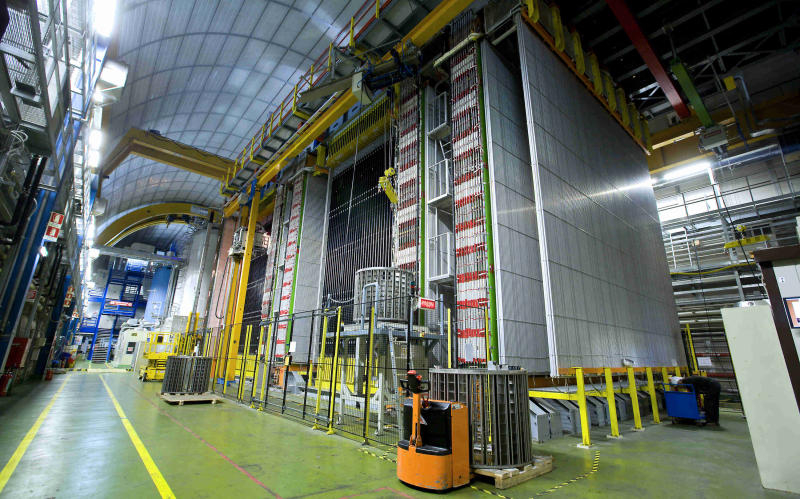
 Credit: INFN
Credit: INFN
Light OPERA; or Faster?
Neutrinos cause physicists much angst. These "ghost particles", so-called because they pass untouched through matter, are among the most poorly-understood of the fundamental particles which make up the Universe. They were first postulated to exist by Wolfgang Pauli in order to conserve energy and momentum in certain radioactive decays. They were then theoretically described (and named) by Enrico Fermi in 1934, 25 years before they were experimentally observed. Neutrinos produced by thermonuclear reactions in the core of the Sun provide astrophysicists with a direct measure of conditions at the center of the Sun, and for a while seemed to suggest that the well-established model of the solar interior didn't actually work - until it was realized that our understanding of the neutrino itself, and not thermonuclear physics, was faulty. Now neutrino studies have undermined one of the most fundamental tenets of modern physics: that nothing can move faster than the speed of light. This limit is the foundation of Einstein's Special Theory of Relativity, a theory which has been confirmed again and again experimentally. But recent attempts by scientists using the OPERA experiment (pictured above) to measure a beam of about 15000 neutrinos, generated at CERN (the Conseil Européen pour la Recherche Nucléaire, a powerful particle accelerator in Switzerland) showed something unexpected. Apparently these neutrinos traveled the 730 km distance separating CERN and OPERA at a speed some 20 parts per million above the speed of light, as reported by the research team. An astounding result, and one that will be truly revolutionary, if it can be confirmed.
Published: September 26, 2011
<
HEA Dictionary ● Archive
● Search HEAPOW
● Other Languages
● HEAPOW on Facebook
● Download all Images
● Education ● HEAD
>

Each week the HEASARC
brings you new, exciting and beautiful images from X-ray and Gamma ray
astronomy. Check back each week and be sure to check out the HEAPOW archive!
Page Author: Dr. Michael F. Corcoran
Last modified Tuesday, 27-Feb-2024 10:13:27 EST


